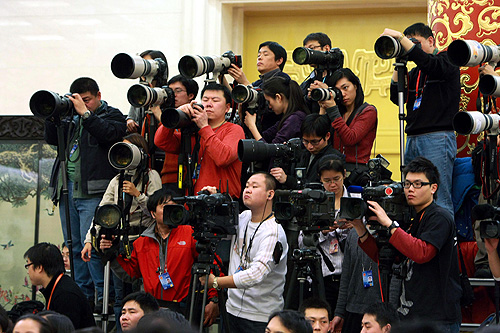| 
"Once the door is open, it is impossible to close it again," said a Chinese friend as we discussed this year's National People's Congress (NPC) debates on the subject of the economy. In other words, while the economic moves approved in Premier Wen Jiabao's government work report were fairly cautious--no major structural reforms, no signs of an imminent rise in interest rates, no change to the government's stimulus policy, no change in renminbi valuation--the liveliness of debate at the lianghui, or two conferences, i.e. the yearly sessions of the NPC and the Chinese People's Political Consultative Conference (CPPCC) National Committee, in the media and among policy makers is likely to be repeated and enhanced in future years.
 |
|
MEDIA FRENZY: Photographers gather at a press conference on March 14, when Premier Wen Jiabao addressed the Chinese and foreign media after the closing meeting of the third session of the 11th National People's Congress (JIANG XIAOYING) | There were dissenting voices over the sustainability of last year's growth, bolstered as it was by the government's 4 trillion yuan ($586 billion) stimulus package. Some felt many projects implemented in the provinces were unnecessary or potentially damaging to the environment, others warned of corruption and abuse by local officials. Fears over financial irregularities and the embezzlement of public funds led to some changes in Premier Wen's work report. He had originally asserted that "we must outlaw illicit income and regulate grey income to gradually develop an open and transparent income distribution system" but the final version approved by the NPC referred to the need to "protect legal income," "adjust excessively high income" and "ban illegal income." Defining "grey income"--despite the fact that everybody knew what the Premier was referring to--seemed too sensitive a task.
Another unexpected development was an open session marked by surprisingly emotional calls from the heads of some of China's top SOEs for public understanding of their role and less resentment of their subsidies. SOEs had been the target of criticism that they retained too high a proportion of their profits, failed to shoulder enough social responsibility and that their leaders' salaries were disproportionately high in comparison to ordinary workers'. Sun Wenjie, Chairman of the China State Construction Engineering Corp, riposted that SOE leaders were "people, not gods" and claimed China's GDP would have collapsed last year without SOE contributions.
China's housing market accounted for around half of all proposals made by NPC deputies and CPPCC members this year, and was also rated as the area of highest public concern in many polls and online surveys. Urban dissatisfaction and the possibility of uncontrolled lending by the banks were highlighted. CPPCC member Pan Qingling said that prices in Beijing were now proportionately higher than in Tokyo and warned of an impending property bubble. But for many there was a disappointing response at the NPC. Everyone was agreed on the magnitude of the problem--Jian Weixin, Minister of Housing and Urban-Rural Development, admitted China would face rising house prices for the next 20 years as rapid industrialization and urbanization drove demand--but no concrete proposals emerged to cope with the problem of soaring prices.
After all the talking, and now that "sessions' season" is over for another year, what are my conclusions? Was that "rubber stamp" accusation, repeated again in many Western papers this year, justified? Well, yes and no. Certainly the government work reports this year were passed with fewer abstentions and no votes than previously; one CPPCC member prided herself on never having voted against any motion because she "loves her country;" and one CPPCC member spent nearly 40 minutes in exhaustive praise of Wen's work report. On the other hand, the CPPCC member was cut off by another delegate, who lambasted delegates and officials for their high-flown language and for espousing form at the expense of substance; a Hong Kong NPC deputy suggested tracking the progress of proposals once they have been sent on to ministries; and some media outlets praised the authenticity of some voices and called for more candid contributions.
It seems clear that there is a public appetite for greater honesty, transparency and efficiency from their representatives. And that open, constructive debate and the accurate transmission of the views of the Chinese people can only help decision makers. Steps have been taken in this direction. But the bold moves the critics of the lianghui would require before changing their "rubber stamp" mindset would sit uneasily with the more cautious, incremental and consensus-based style natural to the Chinese system.
Not exactly a rubber stamp. But not yet fully functioning either. The lianghui have the potential to play a far greater and more positive supervisory role and to speak out more convincingly on behalf of the people they represent.
(Viewpoints in this article do not necessarily represent those of Beijing Review)
The author is a British researcher in Beijing
| 